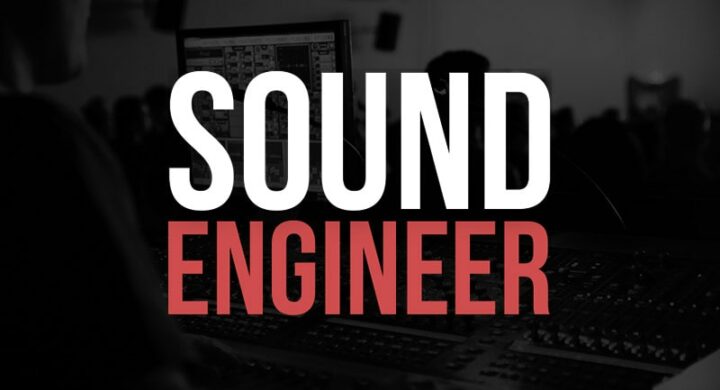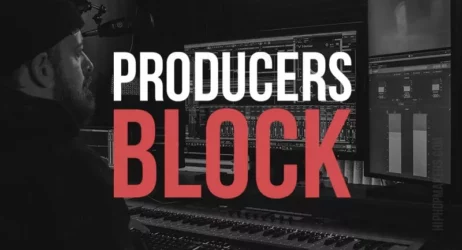This quick guide will answer what a Sound Engineer is, what they do, how much they make, and the skills needed to be one.
- What Is A Sound Engineer
- What Does A Sound Engineer Do
- What Is A Sound Engineer’s Salary
- Audio Engineer vs. Sound Engineer
- Do I Need A Sound Engineer Degree
- How Do I Become A Sound Engineer
What Is A Sound Engineer?
A Sound Engineer focuses on the technical aspects of sound, which is the process of recording, editing, mixing, and live audio. They are responsible for audio levels when working with session musicians and mixing audio at live events. They are taught to use a wide variety of audio equipment.
Sound engineers are also known as audio engineers. They are responsible for the quality of sound. A sound engineer controls microphones, sound levels, and outputs by using their instinct and acoustic knowledge to produce high-quality sound.
A sound engineer doesn’t have to work exclusively in the music industry but can use their skill in different avenues.

In addition to the music industry, they can work in film, television, radio, computer games, theater, corporate and sporting events. Their imagination only limits the scope of their job.
Related: 15 Best Audio Engineering Courses Online
Sound engineers specialize in one area of sound engineering such as:
- Studio – Recording for commercial film, TV, radio, music, advertising, gaming, and interactive media purposes
- Live Events – Such as music concerts, sports games or ceremonies, weddings, and graduation ceremonies
- Live Sound – Front of the house or monitor and foldback
- Broadcast for radio or TV
- Advertising
- Computer Games
- Studio Recording – Mixing and mastering.
Operating a large mixing board at a live show is known as mixing the front-of-house sound. However, that’s only one part of sound engineering.
There are four steps to the professional production of a recording:
- Recording
- Editing
- Mixing
- Mastering
There are different types of sound engineers with specific skill sets and specializations for each of the steps.
It is common for small events to have a single sound person fulfilling all the roles, but a larger team of engineers is required for large venues and tours. Sound engineers have other roles, including:
Studio Audio Engineers
They work in studios to produce high-quality music, sound effects, and speech recordings.
Monitor Audio Engineers
Their job is to control the sound a band hears on their monitors when performing on stage.
Wireless Microphone Engineers
They are in charge of the wireless microphones during sports events, theater productions, and corporate events.
Systems Engineers
They are responsible for setting up amps, complex PA systems, and speakers for other sound engineers and bands.
Research & Development Audio Engineers
They are responsible for inventing new technologies, equipment, and techniques to improve sound quality.
Game Audio Engineer
They work on the sounds for computer and video game development.
Besides a degree of technical competence and sound knowledge of musical recording technologies, a sound engineer requires additional skills.
A sound engineer usually has to work in a team, so they must be a team player and effectively communicate and collaborate with technical staff and performers.
How creative an engineer is determined by how well he will perform in the long run. A positive attitude with a good ear for pitch, timing, and musical sounds is crucial for a sound engineer.
Live performances can be taxing, and one needs to stay calm under pressure. A good sound engineer must possess strong interpersonal skills and the capability of handling criticism.
What Does A Sound Engineer Do?
The responsibilities of a sound engineer depend on whether he is working in live or recorded sound and the size of the team. Some of the things that are required are:
- Design, set up, and test the audio equipment, including speaker system and microphone
- Assist in individual recordings of instruments and vocals in a studio
- Conduct dialogue with the director, producer, or the artist to understand their artistic vision
- Perform sound checks for front of house and the foldback system or stage monitor in live sound
- Communicate with other departments to ensure smooth operations
- Use a mixing console to create a live mix during a performance
- Adjust and add sound effects during a live performance, such as equalization and echo
- Manage any technical problems relating to sound that arise during the performance
- Maintain audio equipment during and after a performance or studio session
- Edit, mix and enhance recorded tracks
- Use specialist equipment such as filters or equalizers to create a final version
- Archive and log the studio recording
What Is A Sound Engineer’s Salary?
The salary of a sound engineer depends on the industry they specialize in, whether they are working in a small studio or a large one, whether they work in small venues or a live music tour. The average annual salary of a sound engineer in the United States is $53,876 a year. Depending on the scale of work and the engineer’s competency, they can earn up to $107,500 a year or as low as $19,500 a year.
The majority of sound engineers earn between $35,000 to $68,000, while top-earners make $90,500 annually in the United States. The average pay range varies greatly due to sound engineers’ skill level, location, and experience.
Audio Engineer vs. Sound Engineer. What’s the Difference?
The difference between an audio engineer and a sound engineer is subtle. The skills and knowledge that are required to perform their respective roles are similar to a great extent.
Both are involved in the production of music and aim at improving the quality of sound.
The main difference between the two is that audio engineers cover the various aspects of an audio application, but sound engineers cater to a specific job of designing.
A sound engineer produces sound for films, TV, or games. They work in collaboration with composers function as an in-house studio manager. They act as the communication medium between engineers and acoustic consultants and provide audio, video, and acoustical design.
Related: What is an Audio Engineer
Do I Need A Sound Engineer Degree Or Go To School?
Most of the new entrants to the music industry have a degree in relevant music technology, such as audio engineering or sound engineering. As they are required to use complex equipment, they must possess a high level of knowledge.
It is possible to enter the industry with an undergraduate degree in music, physics, mathematics, or engineering, followed by a postgraduate in music technology.
Sound engineers mostly study engineering, music, or audiovisual communications technologies. Around 53% of sound engineers have a bachelor’s degree, while 26% hold an associate degree, and an associate degree is enough to land you an entry-level job.
Sound engineers can gain certification from national organizations as the Society of Broadcast Engineers.
The certificate is documentation of education levels and personal competence as per industry standards and can increase job opportunities and pay scale for sound engineers.
Other national organizations offer similar widely recognized credentials.
Besides its various levels of certification, the Certified Audio Engineer requires a mandatory period of five years of related, full-time experience. Each year of technical education is equal to a year of experience.
Is an audio engineering degree necessary to become an engineer? No. Sound engineers learn through experience, starting as an intern in a studio and being mentored by seniors to hone their skills.
As the professional studio setting has changed, a newbie has a better chance of learning through YouTube than being in a studio. An audio engineering degree is excellent for learning fundamentals, but you acquire practical skills through real-world experience.
How Do I Become A Sound Engineer?
If a person wants to pursue sound engineering, they generally need a high school diploma, but a university degree and certification in a relevant subject may be necessary at times. Past work experience is often required for a sound engineers and even those assisting sound engineers.
The most important aspect is the knowledge of audio equipment and creativity.
When you decide to become a sound engineer, one of the first things to assess is the amount of education that you need. According to statistics, 53% of sound engineers have a bachelor’s degree, while 4.3% have a master’s degree.
However, it is possible to become a sound engineer with just a high school degree or GED.
The next point of consideration is choosing the right major. As a sound engineer must have extensive technical knowledge, a college can help significantly develop strong engineering skills. In the field of music, experience counts the most.
Hands-on experience gained from other jobs related to the studio, live performance, or music, in general, can help you become a sound engineer.
Many engineering jobs require experience in the form of an internship. If you decide not to study for a bachelor’s degree, you can develop your skill by taking music classes and joining sound editing courses.
Once you have gained experience and created a portfolio, you are ready to start the job hunt. Here’s a quick checklist for you to kick-start your career as a audio engineer:
- Get a High School Diploma
- Earn a bachelor’s or Associate Degree
- Complete an internship at a production company and create your portfolio
- Start hunting for jobs
Sound Engineer Overview
A Sound Engineer is a person who focuses on the technical aspects of sound, which include recording, editing, mixing, and live sound. While working with session musicians and mixing audio at live events, they are responsible for audio levels. They are taught how to use a range of equipment.
In the exciting world of music and sound, a sound engineer, sometimes called an audio technician or sound technician, holds a job of great importance.
The magic we hear in music recording studios and other recording studios is often their handiwork. Using advanced audio software and sound technology, they breathe life into the songs we love, making sure everything is just right.
A sound engineer’s tasks include capturing and reproducing sound, editing, mixing, and mastering tracks. They are the superheroes of sound recording, standing shoulder to shoulder with the music producer during a recording session.
By adjusting volume levels and mixing sound, they ensure that the best sound quality is achieved, making each note shine brighter and every beat hit harder.
This role goes beyond the technical side. A good audio engineer also has a keen ear for music and a wide range of skill sets, such as understanding the different types of recording equipment used in a recording studio.
Recording engineers, mastering engineers, and mixing engineers play different roles, but all contribute to the final audio production.
A recording engineer, for example, will focus on recording sound during a recording session, while mixing and mastering engineers make the music sound its best during post-production.
While having the right technical know-how is essential, having an understanding of how other equipment in the recording sessions works can be just as important.
This is where the right path comes in. Enrolling in specific courses can provide you with a robust skill set, making you a better audio engineer.
To wrap things up, being a sound engineer is a job that requires a mix of technical expertise, a love for music, and a keen ear for detail.
To become a successful audio sound engineer, remember to stay updated with the latest sound equipment, hone your skills in various recording studios, and constantly experiment with different techniques in audio software.
Remember, it’s not just about adjusting sound sources but also about creating an experience that listeners will remember.
As a bonus tip: Keep listening to a wide range of music, and always be curious. Try out new things, be it new audio production techniques or playing around with volume levels.
This fascinating job offers a wide range of opportunities, from working in music recording studios to live sound mixing at concerts, or even working on post-production for films.
So if you love music production and have a knack for the technical side, this could be the right path for you.
I hope you now have a good understanding of what a sound engineer is and what they do.




